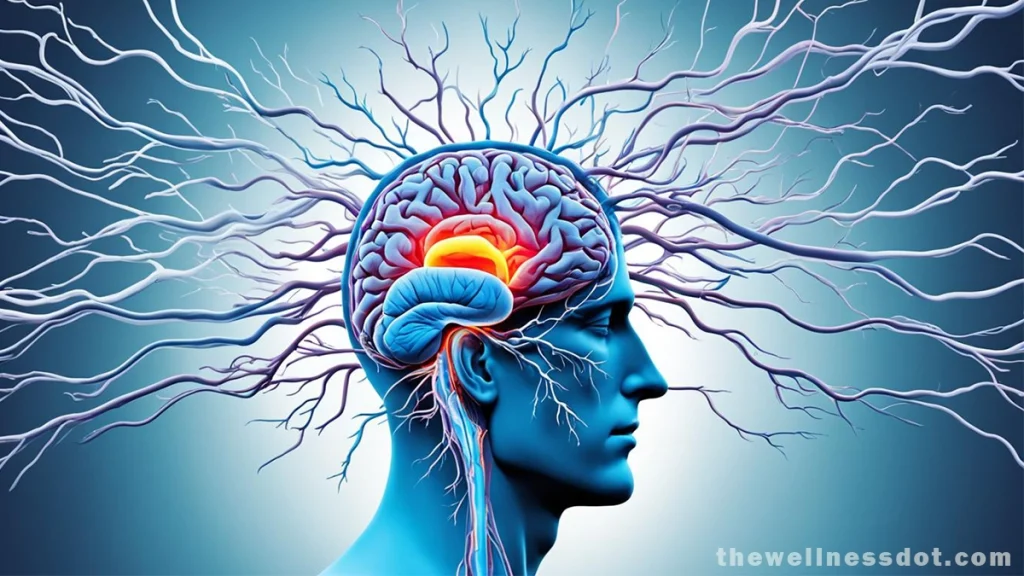Welcome to our detailed look at bipolar disorder. This article dives into the various causes and triggers of the condition. Knowing about these causes sheds light on the intense emotional highs and lows people with bipolar disorder face.
- The causes of bipolar disorder are multifactorial, involving a combination of genetic, environmental, and neurochemical factors.
- Understanding what causes bipolar disorder is crucial for effective management and treatment.
- Recognizing the impact of stress and lifestyle on bipolar disorder can aid people in making healthy choices for their mental health.
- While the causes differ from person to person, studies point to neurotransmitter imbalances, like serotonin and dopamine, as key in bipolar disorder.
- Studying the causes of bipolar disease highlights the necessity for tailored diagnosis and treatment approaches.
Table of Contents
Unraveling the Mystery of Bipolar Disorder.
Ever wondered what bipolar disorder is? Get ready for a journey. We will look into different parts of this mysterious condition. We will focus on hypomanic episodes. They are a vital part of the bipolar experience, showing as increased mood, energy, and creativity.
Hypomanic is like a small-scale manic episode. It’s a time of great happiness that boosts your productivity and self-belief. You feel like the heartbeat of an inspirational speech, full of power.
During hypomania, you can do big things and start new projects. Your thoughts are clear, and you may even multitask well. But, there’s also an inner feeling of unrest that keeps the energy going.
It’s key to remember that not all hypomanic episodes are bad. They can lead to new ideas and ways of doing things. Yet, they might turn into something risky or upset your usual life.
Now we know a bit about bipolar disorder and hypomanic episodes. Next, we’ll explore more about the condition. We’ll learn about what causes bipolar disorder and its effects on life.
Within the Depths of Bipolar Disorder
- Unpredictable mood swings
- Shifts between mania and depression
- Intense emotional states
- Disruptive sleep patterns
- Impulsive behavior
“The journey into the depths of bipolar disorder is an ever-unfolding exploration of self-discovery and resilience.” – Anonymous
Recognizing the Symptoms of Bipolar Disorder.
Bipolar disorder is a condition where moods swing drastically. Knowing the signs helps in dealing with the illness. It’s crucial to see the symptoms and learn more about bipolar depression. This way, you understand what’s going on and how to address it.
What are the symptoms of bipolar?
People with bipolar disorder have intense mood, energy, and activity changes. These shifts are sometimes hard to predict. Symptoms may change with every episode. Some signs of bipolar are:
- Manic episodes, where mood is high
- Feeling very happy or very angry
- Working a lot and needing less sleep
- Thinking and talking quickly
- Having big unrealistic thoughts
- Acting without thinking
- Risk-taking in fun but dangerous ways
- Depressive episodes, where mood is low
- Feeling sad, hopeless, or worthless
- Not enjoying things that used to be fun
- Being very tired with little energy
- Finding it hard to focus or decide
- Eating and sleeping differently
- Thinking about death or suicide
What are the causes of bipolar depression?
Bipolar depression is a key part of this disorder. It likely comes from a mix of genes, biology, and the environment. Issues with brain chemicals, like serotonin and dopamine, might also play a role.
“Bipolar disorder is like having a roller coaster ride inside your brain. It’s a wild journey of extreme highs and lows, but recognizing the symptoms and seeking treatment can help you regain control.”
If you think you or someone you know has bipolar disorder, don’t wait to get help. A mental health professional can check the symptoms and find the right support.
Understanding Bipolar Episodes.
Bipolar episodes are a lot like unexpected guests at a party. They can quickly turn things from good to chaotic. We want to know, what makes these episodes happen?
Many factors contribute to bipolar episodes, but we’re still learning. An important one is the imbalance of neurotransmitters in the brain. These include serotonin and dopamine. They help regulate our emotions. When they’re off, our feelings can go on a wild ride.
Stress is another big player with bipolar episodes. It can come from work, relationship troubles, or feeling overwhelmed. Stress is essentially a tornado in our minds, mixing up intense emotions and odd behavior.
“The brain is a wonderful organ; it starts working the moment you get up in the morning and does not stop until you get into the office.” – Robert Frost
Sleep problems, substance misuse, and specific drugs can also kick off bipolar episodes. Imagine your sleep patterns as the ‘keeper of calm.’ Messy sleep can make your emotions unstable, possibly leading to an episode.
Okay, we’ve talked about the causes. But how do we deal with these episodes? Building good coping strategies is key. This might mean keeping a regular sleep routine, finding stress-busting activities you enjoy, and getting help from professionals and friends.
Common Triggers and what causes bipolar disorder
| Triggers and Causes | Description |
|---|---|
| Disruption in neurotransmitter levels | Imbalances in brain chemicals can lead to erratic mood swings and emotional instability. |
| Stress | External pressures can act as a trigger, sending emotions spiraling out of control. |
| Sleep disruptions | Irregular sleep patterns can disrupt emotional regulation, contributing to bipolar episodes. |
| Substance abuse | Drug or alcohol abuse can worsen bipolar symptoms and increase the likelihood of episodes. |
| Medication interactions | Some medications can trigger or exacerbate bipolar episodes, requiring careful monitoring. |
Know the triggers and learn how to handle them. By creating good strategies and getting professional advice, you can get back in the driver’s seat of your emotions.

Medication and Treatment for Bipolar Disorder.
Life with bipolar disorder can be difficult. Thankfully, many medications and treatments are available to help. They can lessen symptoms and improve how you feel every day. Remember, while bipolar disorder can’t be cured, these options can greatly enhance your well-being.
Medications for Bipolar Disorder
Mood stabilizers are the key drugs for treating bipolar disorder. They help even out the extreme highs and lows of the illness. This lessens mood swings. Lithium, one of the most common mood stabilizers, is very effective in treating bipolar symptoms.
Antipsychotic drugs are also used to handle manic or mixed episodes. And, antidepressants can ease symptoms of depression. But, remember that doctors usually pair antidepressants with a mood stabilizer to avoid making manic episodes worse.
Your doctor will pick the best medications for you. They will consider your unique symptoms and health history. Following your treatment plan and keeping your doctor informed about your condition is crucial.
Other Treatment Modalities
Along with medicine, there are other ways to help manage bipolar disorder:
- Psychotherapy: Sessions like cognitive-behavioral therapy (CBT) or interpersonal therapy (IPT) can aid you in finding and using healthy ways to cope. They help manage stress and improve your social life.
- Support groups: Being part of these groups, or joining organizations focused on bipolar disorder, offers support and insight. It connects you with others who understand the challenges of living with the condition.
- Lifestyle adjustments: A stable lifestyle is key. This includes having a regular sleep pattern, staying active, and reducing stress through hobbies or relaxation. These changes are vital for your mental health.
Remember, there’s no one-size-fits-all approach to treating bipolar disorder. Personalized care, good communication with your health team, and taking care of yourself are essential for your journey.
“The right combination of medications, therapy, and lifestyle adjustments can empower individuals with bipolar disorder to lead fulfilling lives, despite the challenges they face.”
| Treatment Modality | Benefits |
|---|---|
| Medication (Mood Stabilizers, Antipsychotics, Antidepressants) | Regulates mood swings, reduces symptom intensity |
| Psychotherapy | Develops healthy coping mechanisms, manages stress, improves relationships |
| Support groups | Provides a sense of community, increases understanding, shares insights |
| Lifestyle adjustments | Balances lifestyle, enhances stability, improves overall well-being |

Navigating the Impact of Bipolar Disorder.
Bipolar disorder affects not just those diagnosed, but also their loved ones and work. This makes daily life challenging. But, there are ways to understand and deal with these challenges.
The Impact on Relationships
It can be hard for loved ones to deal with the mood swings and intense emotions. It’s key for both the person with bipolar and their family to learn about the condition. Good communication, empathy, and support can help keep relationships strong.
The Impact on Work
Job success is possible with bipolar disorder. Setting a daily routine, taking care of yourself, and support from co-workers can make a big difference. Sharing your needs with your boss can also lead to a more supportive workplace.
The Impact on Daily Life
Bipolar disorder affects how you handle daily tasks, money, and your health. It’s important to have ways to cope. This might mean having a support network, keeping up with self-care, and seeing professionals when necessary.
Managing bipolar disorder takes ongoing effort. Self-awareness, support, and resilience are essential. Help from mental health experts, support groups, and loved ones is available and effective.
Strategies for Coping
- Get help from therapists and doctors who know about bipolar disorder.
- Join support groups or connect with friends for emotional support.
- Stick to a daily routine that includes exercise, sleep, and healthy eating.
- Do things that help you relax, like meditation or hobbies.
- Know your triggers and warning signs to help avoid mood swings.
Understanding and Empathy
Everyone needs to learn about and understand bipolar disorder. Knowing it’s a medical issue and not a fault helps build a better support system. We should work to end the stigmas and talk openly.
| Challenges Faced | Strategies for Coping |
|---|---|
| Strained relationships | Educate yourself and loved ones about the condition, practice open communication, and seek support. |
| Workplace difficulties | Establish a structured routine, practice self-care, and communicate with employers to create a supportive work environment. |
| Impacts on daily life | Develop healthy coping strategies, create a support system, and prioritize self-care and professional help when needed. |
To deal with bipolar disorder, be patient and kind to yourself. Use good coping strategies, get professional help, and understand each other. You can still have a rewarding life.
Conclusion
Understanding bipolar disorder is essential to help those affected. Knowing the signs, seeking help, and learning how to cope can really make a difference. This way, people with bipolar disorder can manage their moods better.
Dealing with bipolar disorder is tough, but it can be done with the right help. It’s important to use medication, therapy, and take care of yourself. Also, having a strong support group is vital.
Every person’s journey with bipolar disorder is different. Working closely with healthcare providers for a plan that fits is crucial. By being proactive, people can minimize symptoms and feel more in control.
It’s important to keep learning about bipolar disorder. This can help reduce the wrong ideas others have and better support those with the condition. We all need to work together to ensure everyone, including those with bipolar disorder, gets a fair chance at a happy life.
FAQ
What are the causes of bipolar disorder?
Bipolar disorder’s origins are still under study. Scientists think both genes and the environment are at play. Having family members with the disorder, brain differences, and chemical imbalances may increase your risk.
What causes bipolar depression?
Bipolar depression is part of the disorder’s cycle. It comes from a mix of genes and environmental issues. People feel extremely sad, lose interest in things, and get tired during these times.
What causes a bipolar episode?
Bipolar episodes can start from stress, sleep changes, drugs, or certain meds. They can be very high (manic) or very low (depressive). It’s key to spot and deal with what triggers these episodes.
What are the symptoms of bipolar disorder?
Bipolar disorder shows as mood swings between mania and depression. Mania brings high energy and an excited mood. Depression shows as deep sadness and losing interest. These can affect everyone differently.
What is hypomanic?
Hypomania is like a toned-down mania seen in bipolar disorder. It boosts your mood and productivity but doesn’t disrupt life as much. You might need less sleep but not end up in the hospital.
Which medication treats bipolar disorder?
Several drugs can calm bipolar symptoms. Mood stabilizers like lithium steady mood swings. Antipsychotics (like quetiapine) help with mania. Doctors also use antidepressants and anti-anxiety drugs when needed.



